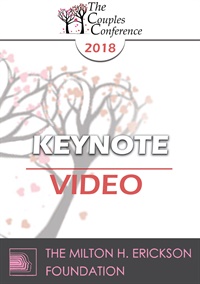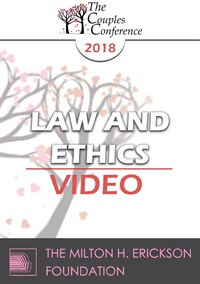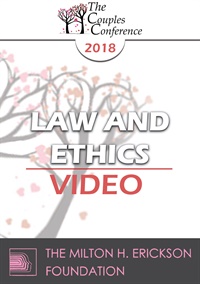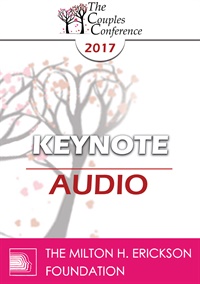Couples Conference

Credit available - Click Here for more information
- Average Rating:
- Not yet rated
- Topic Areas:
- Addiction | Keynotes | Continuing Education | Love | Couples Therapy | Neuroscience | Sex and Sexuality
- Categories:
- Couples Conference | Couples Conference 2018 | Online Continuing Education
- Faculty:
- Helen E. Fisher, PhD
- Course Levels:
- Master Degree or Higher in Health-Related Field
- Duration:
- 57:05
- Format:
- Audio and Video
- Original Program Date:
- May 04, 2018
- Short Description:
- Biological anthropologist Helen Fisher discusses three brain systems that evolved for mating and reproduction: the sex drive; feelings of intense romantic love; and feelings of deep attachment to a long term partner. She then focuses on her brain scanning research (using fMRI) on romantic rejection and the trajectory of love addiction following rejection. She concludes with discussion of the brain circuits associated with long-term partnership happiness and the future of relationships in the dig
- Price:
-
Sale is $29.00
price reduced from Base Price - $59.00

Credit available - Click Here for more information
- Average Rating:
- Not yet rated
- Topic Areas:
- Law & Ethics | Continuing Education | Couples Therapy | Therapist Development
- Categories:
- Couples Conference | Couples Conference 2018 | Online Continuing Education
- Faculty:
- A. Steven Frankel, PhD, JD, ABPP
- Course Levels:
- Master Degree or Higher in Health-Related Field
- Duration:
- 3:33:07
- Format:
- Audio and Video
- Original Program Date:
- May 03, 2018
- Short Description:
- This six-hour program seeks to provide information and recommendations for mental health professionals whose work includes the assessment and treatment of couples and families. The program begins with an update on legal and ethical developments that affect providers, and then moves to a discussion of risk management strategies for clinicians, including the most critical issues faced by clinicians in their work. We continue with important issues concerning confidentiality and “secrets"
- Price:
- $0.00 - $29.00

Credit available - Click Here for more information
- Average Rating:
- Not yet rated
- Topic Areas:
- Continuing Education | Law & Ethics | Couples Therapy | Therapist Development
- Categories:
- Couples Conference | Couples Conference 2018 | Online Continuing Education
- Faculty:
- A. Steven Frankel, PhD, JD, ABPP
- Course Levels:
- Master Degree or Higher in Health-Related Field
- Duration:
- 1:09:54
- Format:
- Audio and Video
- Original Program Date:
- May 03, 2018
- Short Description:
- This six-hour program seeks to provide information and recommendations for mental health professionals whose work includes the assessment and treatment of couples and families. The program begins with an update on legal and ethical developments that affect providers, and then moves to a discussion of risk management strategies for clinicians, including the most critical issues faced by clinicians in their work. We continue with important issues concerning confidentiality and “secrets"
- Price:
-
Sale is $29.00
price reduced from Base Price - $59.00

- Average Rating:
- Not yet rated
- Topic Areas:
- Couples Therapy | Trauma | Keynotes | Intimacy | Attachment | Neurobiology | Relationships
- Categories:
- Couples Conference | Couples Conference 2017
- Faculty:
- Janina Fisher, PhD
- Duration:
- 54:20
- Format:
- Audio Only
- Original Program Date:
- Apr 02, 2017
- Short Description:
- Early childhood trauma has lasting and dramatic effects on attachment formation and on the later capacity for intimacy and mutuality. Instead of experiencing relationships as a haven of safety, traumatized couples are driven by powerful wishes for and fears of closeness. By using somatic and mindfulness-based interventions, conflictual patterns are disrupted, allowing couples to address the intense responses and impulsive reactions that undermine all sense of safety and hope and recreate the experience of threat in the body and in the relationship.
- Price:
- $15.00 - Base Price

- Average Rating:
- Not yet rated
- Topic Areas:
- Couples Therapy | Workshops | Somatic Experiences
- Categories:
- Couples Conference | Couples Conference 2017
- Faculty:
- Janina Fisher, PhD
- Duration:
- 1:56:31
- Format:
- Audio Only
- Original Program Date:
- Apr 02, 2017
- Short Description:
- CC17 Workshop 10 - Beyond Words: Somatic Interventions for Couples Treatment - Janina Fisher, PhD In traumatized couples, talking about 'what happened' often evokes more conflict than empathy and does not alter their habitual trauma-related animal defense survival responses of fight, flight, freeze, submission, or cry for help. By teaching couples to observe their somatic responses to ea
- Price:
- $15.00 - Base Price
Tags: Somatic Experiences

- Average Rating:
- Not yet rated
- Topic Areas:
- Couples Therapy | Workshops
- Categories:
- Couples Conference | Couples Conference 2017
- Faculty:
- Stan Tatkin, PsyD, MFT
- Duration:
- 1:20:34
- Format:
- Audio Only
- Original Program Date:
- Apr 02, 2017
- Short Description:
- CC17 Workshop 11 - The “Deal Breaker”: Detection and Intervention - Stan Tatkin, PsyD, MFT The PACT therapist is always moving couples toward secure functioning. A deal breaker is a conflict between partners for which there is no workable solution. Deal- breakers lead partners to a dead-end and therefore threaten the existence of the relationship. The couples therapist must play the long
- Price:
- $15.00 - Base Price

- Average Rating:
- Not yet rated
- Topic Areas:
- Addiction | Couples Therapy | Workshops
- Categories:
- Couples Conference | Couples Conference 2017
- Faculty:
- Sue Diamond, MA, RCC
- Duration:
- 1:57:23
- Format:
- Audio Only
- Original Program Date:
- Apr 02, 2017
- Short Description:
- CC17 Workshop 12 - The Sober Truth: Doing Effective Couples Therapy with Addicted Partners - Sue Diamond Potts, MA, RCC Addiction is rampant in our society. Many of us have been both bombarded professionally with this reality and touched personally in some form. Addicts are like tornadoes ravaging their way through the lives of others, and people in need of immediate care are left bleeding on the sidelines. And yet,
- Price:
- $15.00 - Base Price
Tags: Addiction

- Average Rating:
- Not yet rated
- Topic Areas:
- Topical Panels | Couples Therapy | Relationships
- Categories:
- Couples Conference | Couples Conference 2017
- Faculty:
- Janina Fisher, PhD | Martha Kauppi, MS MFT | Rick Miller, MSW
- Duration:
- 58:38
- Format:
- Audio Only
- Original Program Date:
- Apr 02, 2017
- Short Description:
- Relational boundaries can be a source of problems if they are too inflexible or if they are too weak. Clinicians need a method to assess and treat boundary issues.
- Price:
- $15.00 - Base Price
Tags: Couples Therapy Relationships

- Average Rating:
- Not yet rated
- Topic Areas:
- Couples Therapy | Workshops | Multicultural
- Categories:
- Couples Conference | Couples Conference 2017
- Faculty:
- Martha Kauppi, MS MFT
- Duration:
- 1:53:37
- Format:
- Audio Only
- Original Program Date:
- Apr 02, 2017
- Short Description:
- CC17 Workshop 13 - Therapy with Polyamorous Clients: Gaining Cultural & Clinical Competence with a Marginalized Population - Martha Kauppi, LMFT, ACST Polyamory is in the news, in the movies, and in the therapy room. As media attention for this open relationship style grows, more and more people are giving it a try. Working skillfully with this marginalized group requires gaining cultural competence specific to their struggles. Learn who chooses p
- Price:
- $15.00 - Base Price
Tags: Polyamory Relationships

- Average Rating:
- Not yet rated
- Topic Areas:
- Couples Therapy | Workshops | Deception | LGBTQ | Relationships | Sex and Sexuality | Communication
- Categories:
- Couples Conference | Couples Conference 2017
- Faculty:
- Rick Miller, MSW | Stan Tatkin, PsyD, MFT
- Duration:
- 2:00:09
- Format:
- Audio Only
- Original Program Date:
- Apr 02, 2017
- Short Description:
- The gay male subculture emphasizes easy sexual hookups as a norm, without questioning whether this is actually healthy for a couple. This workshop will define how male couples choose exclusivity successfully, how healthy attachment is an important component for considering an open relationship and provide guidelines for managing open boundaries within a couple. Norms in the subculture will be compared to stereotypical heterosexual couples, including what actually constitutes deception or affairs, and how transform deception to a deeper intimacy.
- Price:
- $15.00 - Base Price
Please wait ...

